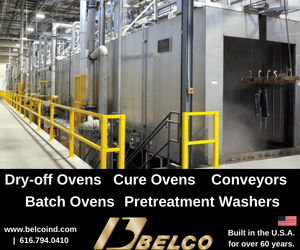Arguments for Outsourcing
What are some good reasons to outsource surface finishing operations?
Q. A large European company is building a manufacturing facility near us. They are considering bringing in surface finishing technology and doing it in-house. What are some arguments I can use for outsourcing? What are some key components to a contract for the outsourcing? —M.D.
A. For many manufacturing companies, the decision to outsource the surface finishing stage is crucial to maintaining a competitive edge within the marketplace while elevating their products to the latest market standards. The implementation of a strategic partnership between a manufacturing company and surface finisher relies heavily on not only the benefits offered by the surface finishers, but also on having a clear and user-friendly contract between the parties.
Here we 1) identify some of the key benefits the surface finisher can attain for the manufacturing company and 2) discuss some of the key components of a successful outsourcing contract for the surface finisher to provide the services.
There are a number of benefits that the surface finisher can advocate to the manufacturers as to why it would be best to outsource the surface finishing function to them. Some examples of these benefits are as follows:
- Attention. By using a surface finisher, a manufacturer can focus on its core business of producing the item or component. It can also free-up the schedules of senior executives to focus on long term strategies.
- Lower costs. Surface finishers will most likely be more efficient at their trade than the manufacturer who would otherwise have to train and use some of its personnel and resources to perform the surface finishing function. In addition, the surface finishers are likely to have made more capital investments in the equipment needed to do the surface finishing.
- Expertise. Surface finishers typically have greater skills and experience than manufacturers and, as a result, can provide better results when performing the surface finishing function.
- Access and delivery. Because surface finishers concentrate on their particular trade for many customers, they are likely to have better access to the raw materials necessary for the process than the manufacturers. Furthermore, the surface finishers are likely to have processes and procedures in place to facilitate faster delivery of the final product.
- Scaling and Staffing. Since the surface finishers work for a number of customers, they will generally have enough personnel and materials on staff to allow the manufacturers to quickly and cost effectively scale up or down the level of production. This capability enables manufacturers to be responsive to production demands and spend less time on employment-related matters.
Once a manufacturer recognizes the benefits of outsourcing the surface finishing function, it is important that the parties enter a fair, clear and user-friendly contract to govern the relationship. The key documents which constitute such an agreement include the following:
- Main Agreement. This document, which is often referred to as the Terms and Conditions, allocates the rights and responsibilities between the parties. It contains such provisions as the term and renewal period, indemnification and liability, confidentiality, audits, intellectual property, dispute resolution, and termination rights.
- Schedules. Whereas the main agreement primarily allocates risk between the parties, the schedules set forth the various components of the business deal. The key schedules include the statement of work (scope of the services), performance standards (quantitative metrics for measurement), and pricing (charge for the services and any appropriate adjustments). Depending on the transaction, other schedules that may be necessary include the transfer of employees and their associated benefits, termination/expiration assistance, transition plan and approved subcontractors,
- Exhibits. Almost any outsourcing agreement has a number of exhibits. Such exhibits might include the form of invoice, company policies (e.g., travel, security), satisfaction survey and a list of any assets being purchased or transferred as part of the agreement.
With the increased pressures on manufacturers to have highly responsive and cost-effective production, this creates opportunities for the surface finishers to provide these services. Once manufacturers complete their internal analyses and decide that outsourcing the surface finishing function is an attractive option, the parties should endeavor to memorialize their discussions in a fair and user-friendly agreement that will govern their relationship. There are a number of specialized consultants and lawyers who can assist surface finishers in this process.
Milton Whitfield, a shareholder in Butzel Long’s Washington, D.C., office who specializes in technology transactions, including outsourcing, contributed to this response.
Related Content
Lapping, Polishing Film Maximizes Strengths, Maintains Flexibility
Dia-Strip and Dia-Sheet film from Titan Tool Supply has a distinct construction that the company says makes it durable while remaining flexible, bendable and formable.
Read MoreUnderstanding Shot Peening
A look inside shot peening — a process of “hammering” of work pieces with precisely defined blast media.
Read MoreVulkan Blast Shot Technology
Vulkan Blast Shot Technology is a pioneer in the stainless steel abrasives market.
Read MoreBlast Nozzle Features Enhanced Noise Reduction
Kennametal adds noise-reducing Blast Ninja to portfolio of abrasive blast nozzles.
Read MoreRead Next
Episode 45: An Interview with Chandler Mancuso, MacDermid Envio Solutions
Chandler Mancuso, technical director with MacDermid Envio discusses updating your wastewater treatment system and implementing materials recycling solutions to increase efficiencies, control costs and reduce environmental impact.
Read MoreA ‘Clean’ Agenda Offers Unique Presentations in Chicago
The 2024 Parts Cleaning Conference, co-located with the International Manufacturing Technology Show, includes presentations by several speakers who are new to the conference and topics that have not been covered in past editions of this event.
Read MoreEducation Bringing Cleaning to Machining
Debuting new speakers and cleaning technology content during this half-day workshop co-located with IMTS 2024.
Read More













.jpg;maxWidth=300;quality=90)











